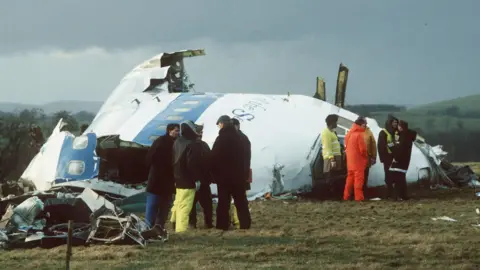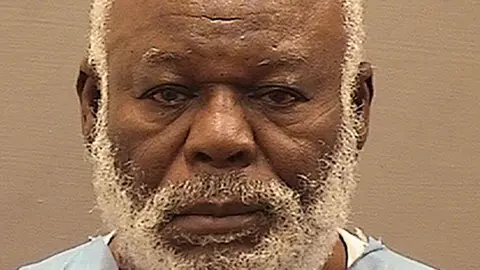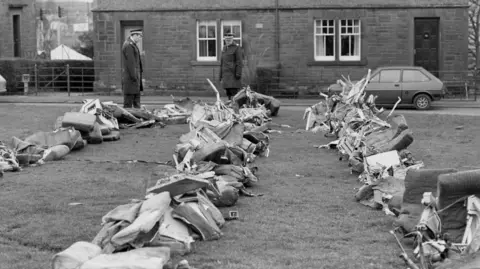 Reuters
ReutersRelatives of victims of the Lockerbie bombing have expressed disappointment after being told they will not be allowed to watch a Libyan suspect’s trial from their homes.
Abu Agila Masud is due to face a jury in Washington DC, accused of building the bomb that brought down Pan Am 103 in December 1988.
As televised trials are banned in American federal courts, the US Department of Justice proposed that people directly affected by the attack should be allowed tightly controlled online access to the proceedings.
However, that has been rejected by US district judge Dabney Friedrich, who feared it could affect Masud’s right to a fair trial.
She has ruled that relatives will be able to watch the case in “designated secure viewing locations,” such as American embassies and courthouses.
It is not yet clear how that will work for people in the UK, where the US has an embassy in London and consulates in Edinburgh and Belfast.
 Pamela Dix
Pamela DixTrudy-Ann Peters was nine when her mother Olive died on the plane and was planning to watch the trial with other relatives at their homes in the Birmingham area.
Olive was going to New York for a shopping trip but missed an earlier flight and caught Pan Am 103 instead.
Ms Peters said: “With it now being at the embassy I’m not sure how much we’ll be able to get involved.
“It’s quite inconvenient but we do understand. We don’t want this case to be hindered in any way at all, we want all the answers to come out.
“If this man is involved, he needs to answer for what he’s done and if it means we need to go the extra mile, we are absolutely willing to do that.”
‘A mission to get access’
Pamela Dix, who lost her brother Peter on the plane, lives in the south of England.
She said it would now be a “mission” to get access to the trial.
Ms Dix told BBC Scotland News: “I’m extremely disappointed. This doesn’t constitute reasonable access under the law that was passed specifically to allow family members to follow this trial.
“The siblings of people who died will be in their 60s and 70s, and the parents are in their 80s and 90s.
“It’s going to be a mission to get access to the trial and that’s frustrating. Having said that, I fully support the US legal process and I want this trial to take place.”
 Reuters
ReutersOf the 270 people who died in the bombing, 190 were American and 43 were from the UK.
The issue of remote access was first raised by American relatives, who said many of them were too old or infirm to travel to Washington for the trial.
US politicians passed the Lockerbie Victims Access Act, directing the court to make “reasonable efforts” to provide video and telephone access to the case for people directly affected by the bombing.
The FBI then identified more than 400 people around the world who were either related to the victims or suffered what was termed “emotional injury” by witnessing the aftermath.
More than 100 were from Scotland and 32 from Lockerbie itself.
 PA Media
PA MediaWith the support of Scotland’s prosecution service, the Crown Office, American justice officials proposed that they could watch the trial on a secure version of the Zoom platform, with the threat of contempt of court for anyone misusing the footage.
They argued that making people go to courthouses or embassies to follow the case would be “logistically unreasonable, unfeasible, impractical and unworkable.”
But Masud’s lawyers argued this was the only way to guarantee footage would not be accessed by unauthorised third parties.
Judge Freidrich said: “Such violations could impair the proceedings and jeopardize the defendant’s right to a fair trial.
“Livestreaming such proceedings to individuals’ personal devices is fraught with risks of a constitutional dimension. In today’s internet age, a rebroadcasted court proceeding could travel around the world and remain electronically preserved forever.”
Kara Weipz, president of the American group Victims of Pan Am Flight 103, said: “It’s extremely disappointing in that we were hoping everyone would have access to the trial and this is obviously going to eliminate people who can’t get to remote sites.
“At the same time, I can’t say that I don’t understand the ruling. No judge wants to have a trial overturned or questioned on appeal.”
Masud is currently undergoing medical treatment for an undisclosed health condition but the trial is still scheduled to get under way on 12 May.



